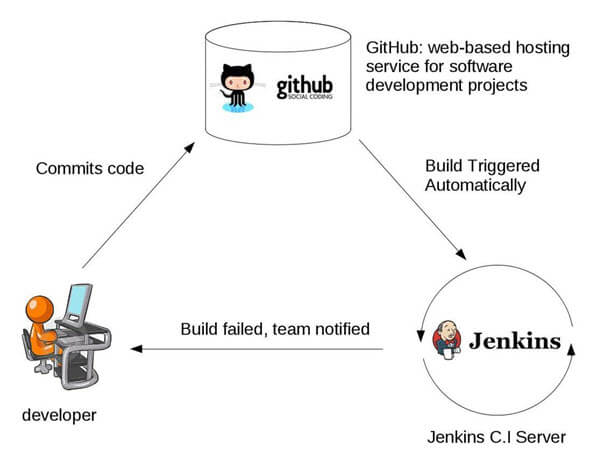What is Continuous Integration?
Continuous Integration is a process of integrating code changes from multiple developers in a single project many times. The software is tested immediately after a code commit. With each code commit, code is built and tested. If the test is passed, the build is tested for deployment. If the deployment is successful, the code is pushed to production.
This commit, build, test, and deploy is a continuous process and hence the name continuous integration/deployment.
How does Jenkins work?
Jenkins is a server-based application and requires a web server like Apache Tomcat to run on various platforms like Windows, Linux, macOS, Unix, etc. To use Jenkins, you need to create pipelines which are a series of steps that a Jenkins server will take. Jenkins Continuous Integration Pipeline is a powerful instrument that consists of a set of tools designed to host, monitor, compile and test code, or code changes, like:
- Continuous Integration Server (Jenkins, Bamboo, CruiseControl, TeamCity, and others)
- Source Control Tool (e.g., CVS, SVN, GIT, Mercurial, Perforce, ClearCase and others)
- Build tool (Make, ANT, Maven, Ivy, Gradle, and others)
- Automation testing framework (Selenium, Appium, TestComplete, UFT, and others)
Advantages of using Jenkins
- Jenkins is being managed by the community which is very open. Every month, they hold public meetings and take inputs from the public for the development of Jenkins project.
- So far around 280 tickets are closed, and the project publishes stable release every three months.
- As technology grows, so does Jenkins. So far Jenkins has around 320 plugins published in its plugins database. With plugins, Jenkins becomes even more powerful and feature rich.
- Jenkins tool also supports cloud-based architecture so that you can deploy Jenkins in cloud-based platforms.
- The reason why Jenkins became popular is that it was created by a developer for developers.

KEY FEATURES
- Private Cloud, exclusively dedicated to the customer
- Sophisticated DR solution with 99.95% availability
- The data redundancy and availability is unparalleled
- VPN based secured access with a variety of connectivity options
- Automated environment setup capabilities leveraging AWS’s advanced features , CI/CD Tools.
- Full transparency and access to the system including access to system console/setup screens and the underlying database.
Not sure what fits your business needs?
Get free consultation!
Experience you can trust, service you can count on.











